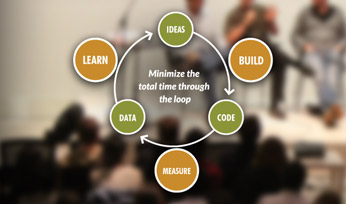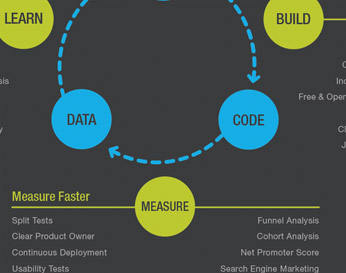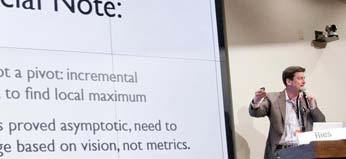“Startup success can be engineered by following the process, which means it can be learned, which means it can be taught.”- Eric Ries
The Lean Startup provides a scientific approach to creating and managing startups and get a desired product to customers' hands faster. The Lean Startup method teaches you how to drive a startup-how to steer, when to turn, and when to persevere-and grow a business with maximum acceleration. It is a principled approach to new product development.
Too many startups begin with an idea for a product that they think people want. They then spend months, sometimes years, perfecting that product without ever showing the product, even in a very rudimentary form, to the prospective customer. When they fail to reach broad uptake from customers, it is often because they never spoke to prospective customers and determined whether or not the product was interesting. When customers ultimately communicate, through their indifference, that they don't care about the idea, the startup fails.
“Using the Lean Startup approach, companies can create order not chaos by providing tools to test a vision continuously.”
“By the time that product is ready to be distributed widely, it will already have established customers.”
Eliminate Uncertainty
The lack of a tailored management process has led many a start-up or, as Ries terms them, "a human institution designed to create a new product or service under conditions of extreme uncertainty", to abandon all process. They take a "just do it" approach that avoids all forms of management. But this is not the only option. Using the Lean Startup approach, companies can create order not chaos by providing tools to test a vision continuously. Lean isn't simply about spending less money. Lean isn't just about failing fast, failing cheap. It is about putting a process, a methodology around the development of a product.
Work Smarter not Harder
The Lean Startup methodology has as a premise that every startup is a grand experiment that attempts to answer a question. The question is not "Can this product be built?" Instead, the questions are "Should this product be built?" and "Can we build a sustainable business around this set of products and services?" This experiment is more than just theoretical inquiry; it is a first product. If it is successful, it allows a manager to get started with his or her campaign: enlisting early adopters, adding employees to each further experiment or iteration, and eventually starting to build a product. By the time that product is ready to be distributed widely, it will already have established customers. It will have solved real problems and offer detailed specifications for what needs to be built.
Develop An MVP
A core component of Lean Startup methodology is the build-measure-learn feedback loop. The first step is figuring out the problem that needs to be solved and then developing a minimum viable product (MVP) to begin the process of learning as quickly as possible. Once the MVP is established, a startup can work on tuning the engine. This will involve measurement and learning and must include actionable metrics that can demonstrate cause and effect question.
The startup will also utilize an investigative development method called the "Five Whys"-asking simple questions to study and solve problems along the way. When this process of measuring and learning is done correctly, it will be clear that a company is either moving the drivers of the business model or not. If not, it is a sign that it is time to pivot or make a structural course correction to test a new fundamental hypothesis about the product, strategy and engine of growth.
Validated Learning
Progress in manufacturing is measured by the production of high quality goods. The unit of progress for Lean Startups is validated learning-a rigorous method for demonstrating progress when one is embedded in the soil of extreme uncertainty. Once entrepreneurs embrace validated learning, the development process can shrink substantially. When you focus on figuring the right thing to build-the thing customers want and will pay for-you need not spend months waiting for a product beta launch to change the company's direction. Instead, entrepreneurs can adapt their plans incrementally, inch by inch, minute by minute.
“Progress in manufacturing is measured by the production of high quality goods. The unit of progress for Lean Startups is validated learning-a rigorous method for demonstrating progress when one is embedded in the soil of extreme uncertainty.”
Principles
-
Entrepreneurs
Are EverywhereYou don't have to work in a garage to be in a startup. Read More
-
Entrepreneurship
Is ManagementA startup is an institution, not just a product, so it requires management, a new kind of management specifically geared to its context. Read More
-
Validated
LearningStartups exist not to make stuff, make money, or serve customers. They exist to learn how to build a sustainable business. This learning can be validated scientifically, by running experiments that allow us to test each element of our vision. Read More
-
Innovation
AccountingTo improve entrepreneurial outcomes, and to hold entrepreneurs accountable, we need to focus on the boring stuff: how to measure progress, how to setup milestones, how to prioritize work. This requires a new kind of accounting, specific to startups. Read More
-
Build-Measure-Learn
The fundamental activity of a startup is to turn ideas into products, measure how customers respond, and then learn whether to pivot or persevere. All successful startup processes should be geared to accelerate that feedback loop. Read More
'BMI > Value Proposition' 카테고리의 다른 글
| [스크랩/백서] Why customer value propositions really matter (0) | 2013.04.08 |
|---|---|
| [스크랩/백서] Harnessing Your Customer Truth - From VP to Sales Proposition (0) | 2013.04.08 |
| [스크랩] How To Craft Your Value Proposition (0) | 2013.02.28 |
| [스크랩] Powerful Value Propositions (0) | 2013.02.28 |
| [스크랩] Value Proposition Worksheet (0) | 2013.02.28 |







